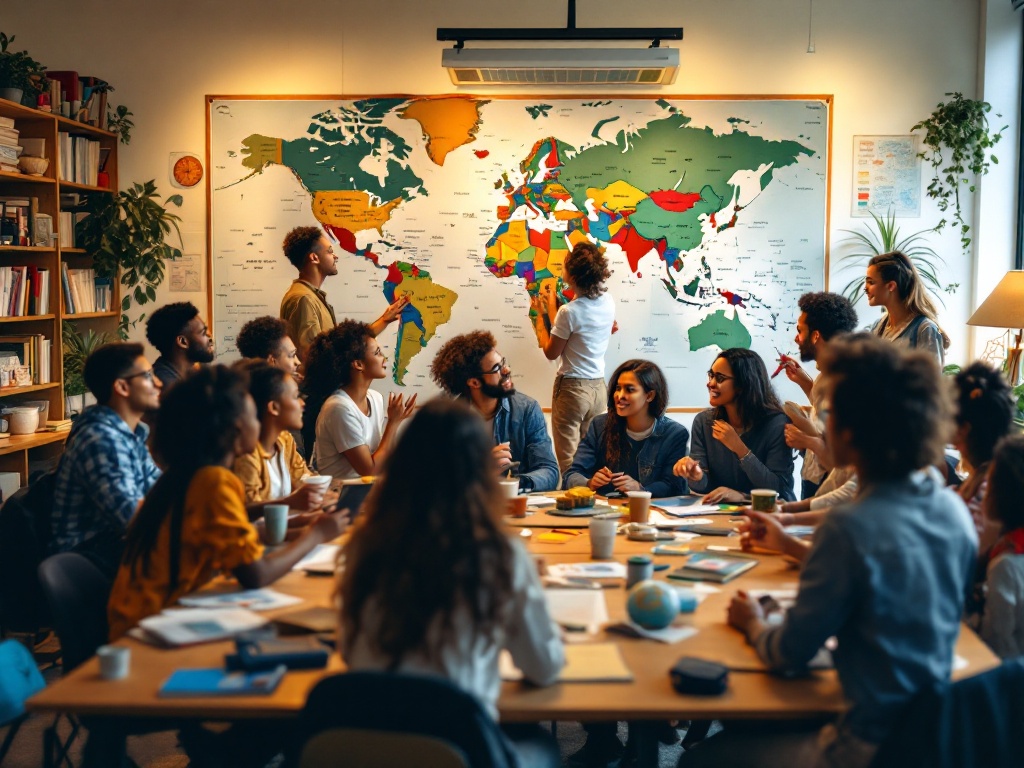How to Prepare Students for International Educational Travel
Ready for a life-changing educational journey abroad? International travel offers incredible learning opportunities, exposing students to new cultures and perspectives. However, careful planning is key for a safe and successful trip. This guide provides essential steps, from understanding cultural norms and managing finances to health precautions and emergency preparedness. Learn how to research your destination, create a comprehensive packing list, and navigate trip guidelines. Empower yourself for a truly enriching international experience. Start preparing today!
Important information

- Research your destination: Learn about local customs, laws, and safety concerns. This helps avoid misunderstandings and ensures a safe trip.
- Prioritize health and safety: Consult your doctor about needed vaccinations and health precautions. Secure travel insurance and pack a first-aid kit.
- Manage finances: Create a realistic budget, inform your bank of your travel dates, and consider exchanging currency in advance.
- Prepare essential documents: Ensure your passport is valid for at least six months beyond your return. Obtain necessary visas and make copies of all important documents.
- Understand program guidelines: Review the itinerary, rules, and expectations. Maintain open communication with program leaders throughout the trip.
Understanding the Importance of Preparing Students for International Educational Travel
International educational travel offers enriching experiences, exposing students to diverse cultures, languages, and perspectives. However, thorough preparation is essential for a safe and successful journey. Understanding the destination’s cultural nuances and legal landscape is crucial, as knowing local customs can prevent misunderstandings. Safety regulations and health precautions are also key elements of a successful trip. Maintaining good health is vital. Proper hydration and nutrition contribute significantly to a positive experience. Students should also practice wise financial management and budgeting while abroad. A comprehensive checklist helps ensure essential items, such as passports and visas, aren’t overlooked. Understanding program guidelines and expectations is equally important. Open communication with program leaders and faculty throughout the trip is vital for a smooth and successful experience. Here’s a step-by-step guide to preparing for your international educational trip:
Step 1: Research your destination.
Thoroughly research the cultural norms, local laws, and any specific safety concerns of your destination. This knowledge will help you avoid misunderstandings and stay safe during your travels.
Step 2: Prioritize health and safety.
Consult with your healthcare provider regarding necessary vaccinations and any health precautions specific to your destination. Pack a well-stocked first-aid kit and ensure you have adequate travel insurance.
Step 3: Manage your finances.
Establish a realistic budget for your trip, accounting for accommodation, food, transportation, activities, and souvenirs. Inform your bank of your travel dates to avoid any issues with your cards.
Step 4: Prepare essential documents.
Make sure your passport is valid for at least six months beyond your return date. Obtain any necessary visas well in advance. Make copies of all essential documents, storing them separately from the originals.
Step 5: Understand program guidelines.
Familiarize yourself with the program’s itinerary, rules, and expectations. Maintain open communication with program leaders and faculty throughout your trip.
Research and Planning for a Successful Trip
Planning an international trip requires careful research. Students should investigate their destination, learning about local customs, laws, and cultural norms. A checklist is essential for packing important items, such as passports, visas, and any necessary medications. Students should also review trip guidelines set by organizers, including all rules, safety protocols, and the code of conduct. Thorough preparation helps students learn more and handle challenges effectively.
Research your destination. Learn about local customs, laws, and cultural norms.
Create a packing checklist. Include essential items such as your passport, visas, and any necessary medications.
Review trip guidelines. Familiarize yourself with all rules, safety protocols, and the code of conduct provided by the organizers.
Conducting Thorough Research on the Destination
Pre-trip research is essential for students traveling abroad. It not only prepares them for cultural nuances but also enhances their overall experience by fostering respect for their host country. By exploring historical sites, local cuisine, and social etiquette, students can meaningfully engage with the community. For instance, those traveling to Japan might learn about tea ceremonies and proper etiquette. Students visiting Italy could delve into Roman architecture. This foundational knowledge transforms sightseeing into active participation rather than passive observation, smoothing the transition into a new culture and minimizing potential misunderstandings. While research is invaluable, it’s the direct experience that truly cultivates cultural understanding.
Creating a Comprehensive Travel Checklist
Planning a trip abroad, especially as a student, requires careful preparation. Use this comprehensive checklist to ensure a smooth and enjoyable journey:
Essential Documents: Gather crucial documents like your passport, visa, and vaccination records. Ensure your passport’s validity extends beyond your trip duration.
Smart Packing: Pack light but smart. Bring necessary clothing, toiletries, and any required medications. Consider the climate and activities you’ll be participating in.
Finances: Exchange currency beforehand to avoid airport exchange rates. Confirm your credit card’s international usability and inform your bank of your travel dates to prevent any issues.
Flight Details: Double-check your flight details, including departure and arrival times, and any connecting flights. Ensure you have all necessary boarding passes or confirmations readily available.
Understanding Trip Guidelines and Expectations
Before departure, review all pre-trip information, including the itinerary, accommodations, and planned activities.
Understand the destination’s specific guidelines. This includes dress codes, cultural norms, and local laws.
Familiarize yourself with emergency procedures, communication protocols, and contact information for teachers and support staff.
Adhere to behavioral expectations for a positive group experience. Consequences will be enforced for any violations.
Acquiring Necessary Travel Documentation and Insurance
Planning a trip abroad requires careful preparation. Verify your passport’s validity and research visa requirements for your destination early, as they can vary significantly. Consult your doctor or a travel clinic about recommended vaccinations. Travel insurance is crucial for protecting yourself from unforeseen expenses.
Travel Insurance Benefits
- Coverage for medical emergencies,
- Protection against lost luggage,
- Trip cancellation options.
Choosing the Right Policy
Compare different travel insurance policies to find the best fit for your needs and budget.
Enroll in the Smart Traveler Enrollment Program (STEP). This free service from the U.S. Department of State allows you to register your trip with the nearest U.S. embassy or consulate. STEP provides valuable safety updates and assists family in contacting you during emergencies.
Ensuring Possession of Passport, Visa, and Vaccinations
Ensure you have a valid passport, international travel requires students to have a valid passport.
Check visa requirements. Depending on your nationality and destination, a visa may be necessary.
Research necessary vaccinations. Certain vaccinations, which vary by country, are often required for entry.
Receive necessary immunizations. Ensure you receive the necessary immunizations before departure to help prevent disease.
Acquiring Travel Insurance for Health and Belongings
Traveling abroad as a student is exciting, but protecting yourself with travel insurance is essential. A good policy safeguards your health and belongings, covering unexpected medical emergencies, lost luggage, and even trip cancellations. This offers invaluable peace of mind for both students and their families. However, carefully review the policy details and select a plan that aligns with your specific needs.
Benefits of Travel Insurance for Students
- Coverage for medical emergencies, including hospitalization and doctor visits.
- Protection against lost or stolen luggage and personal belongings.
- Reimbursement for trip cancellations due to unforeseen circumstances.
- Emergency evacuation and repatriation assistance.
- 24/7 travel assistance services for support and guidance.
Choosing the Right Plan
- Assess your trip duration, destination, and planned activities.
- Compare coverage options and benefits from different insurance providers.
- Check for pre-existing condition limitations and exclusions.
- Read reviews and compare customer experiences of insurance companies.
- Ensure the policy meets visa requirements if applicable.
Enrollment in the Smart Traveler Enrollment Program (STEP)
Before traveling abroad, enroll in the free Smart Traveler Enrollment Program (STEP) to register your trip with the nearest U.S. Embassy or Consulate. This service provides crucial safety information to U.S. citizens and nationals and helps embassies locate you during emergencies. While many study abroad programs automatically enroll students for important safety updates, independent enrollment is also possible. To further prepare, consult resources like the Traveler’s Checklist and those offered by the Overseas Security Advisory Council (OSAC).
Building Language Skills and Cultural Awareness
Learning a few local phrases can significantly enhance a student’s travel experience. For example, knowing how to greet locals, ask for directions, or order food can make a noticeable impact. Furthermore, teaching students about customs like dining etiquette and social interactions helps them avoid misunderstandings and integrate more smoothly. Educating them about cultural sensitivity and local norms promotes respectful behavior and fosters cross-cultural understanding, a truly valuable lesson.
Learning Basic Phrases of the Local Language
Simple phrases like “Hello,” “Thank you,” and “Excuse me” can bridge the gap with locals, smoothing everyday interactions.
Knowing how to ask for directions or order food empowers you to explore confidently and independently.
Greeting people in their language demonstrates respect, fostering positive relationships and proving invaluable in emergencies.
Knowing how to ask for help can be crucial in a difficult situation.
Familiarizing with Local Culture and Customs
Learning key phrases demonstrates respect and facilitates communication, providing a solid foundation for cultural exchange. However, to truly thrive, students should delve deeper, researching cultural norms and customs, including local laws. This encompasses understanding appropriate attire and behavior, as well as legal regulations surrounding alcohol and drugs. Such knowledge empowers students to adapt, interact respectfully, and flourish in their new surroundings.
Educating on Cultural Sensitivity and Norms
Cultural sensitivity training is crucial for students studying abroad, enabling them to avoid misunderstandings and foster strong relationships with locals. Before embarking on their journey, students should delve into local customs. This pre-departure research is invaluable. Discussions about cultural norms and etiquette further enhance their preparedness for respectful interactions. Learning basic local phrases not only improves communication but also demonstrates an appreciation for the host culture, making a significant impact. Students can follow these steps to ensure cultural sensitivity:
Research local customs. Explore cultural norms and etiquette before departure. This pre-departure research is essential for respectful interactions.
Engage in discussions. Participate in discussions about cultural norms and etiquette to enhance preparedness for respectful interactions.
Learn basic phrases. Learning basic local phrases improves communication and demonstrates an appreciation for the host culture.
Role of Teachers in Preparing Students for International Travel
Teachers prepare students for international travel through informational sessions with students and parents. These sessions cover essential trip details, including the destination, itinerary, and cultural nuances. Clear rules and emergency procedures are established, encompassing codes of conduct and curfews. Teachers lead pre-trip discussions focusing on cultural norms and expectations to foster respect, understanding, and responsible behavior abroad. This guidance empowers students to navigate new cultures safely and respectfully.
Holding Information Sessions for Students and Parents
Information sessions prepare students and parents for upcoming trips by providing essential knowledge. These sessions cover various aspects of the trip, including itineraries, accommodations, and academic objectives. Safety procedures, emergency protocols, and cultural norms are also discussed in detail. Open forums allow attendees to ask questions and address any concerns they may have. Teachers share practical advice on packing lists, visa requirements, and health recommendations. They also highlight the importance of cultural sensitivity and responsible travel practices. These comprehensive sessions ensure everyone is well-prepared and informed for a successful and enriching travel experience.
Setting Clear Trip Rules and Safety Measures
Clear trip rules and safety measures are essential for student safety and behavior management. These guidelines should cover expected conduct, local laws, and consequences for violations. Communicating these rules to students and parents promotes compliance and fosters a safe, positive trip experience. Here’s a structured approach to establishing trip guidelines:
Define Expected Conduct. Specify acceptable behavior on the trip, including respect for others, appropriate language, and adherence to schedules.
Outline Local Laws. Familiarize students with relevant local laws and regulations, emphasizing potential legal consequences for violations.
Establish Clear Consequences. Detail the consequences for rule violations, ranging from verbal warnings to trip expulsion, ensuring fairness and consistency.
Communicate Effectively. Distribute the rules to students and parents well in advance of the trip, providing opportunities for questions and clarification.
Promote a Positive Experience. Emphasize that these rules are in place to ensure a safe and enjoyable trip for everyone.
Guiding Students in Discussing Cultural Norms
Understanding cultural norms and customs is essential for a smooth experience. This encompasses appropriate attire, greetings, dining etiquette, and respectful social interactions. Student research and sharing will further enrich this cultural exploration. Because cultural misunderstandings are inevitable, we’ll learn how to navigate them respectfully and with sensitivity. We will also cover local laws and regulations, including those concerning alcohol, drugs, and public behavior.
Ensuring Safety and Security During Travel
Your safety as a student is our top priority. Understanding safety regulations is crucial for a secure experience. Before you go, research your destination and familiarize yourself with local laws. Registering with your embassy or consulate provides an additional layer of security. Compile a list of emergency contacts, including local authorities and your school’s international office.
Staying Safe Abroad: The Buddy System
The buddy system is a vital safety precaution. Traveling with a companion ensures you’re never alone and provides support in unfamiliar situations. Regularly check in with designated contacts back home, share your itinerary, and let someone know your expected return time.
Emergency Preparedness
Emergencies can be unpredictable, so preparation is key. Develop a plan that addresses potential medical issues, lost passports, or natural disasters. Locate nearby healthcare facilities and learn how to contact emergency services. Carry a copy of your passport and secure other important documents. Familiarize yourself with local emergency numbers and your institution’s emergency protocols.
Understanding Safety Regulations and Precautions
Student safety is our top priority. Familiarize yourself with and adhere to all safety regulations at your destination, including local laws, transportation guidelines, and emergency procedures. This knowledge is crucial for a safe and successful trip. Additionally, students should exercise caution by staying aware of their surroundings, protecting their belongings, and avoiding potentially dangerous situations. Be vigilant and stay safe. Always inform someone of your whereabouts and planned activities. Share emergency contact information with program leaders and family members. If you encounter an emergency, contact local authorities first, then program leaders, and finally, your family.
Familiarize yourself with safety regulations. Learn the local laws, transportation guidelines, and emergency procedures at your destination.
Stay aware of your surroundings. Exercise caution and avoid potentially dangerous situations.
Protect your belongings. Be mindful of your possessions and take precautions against theft.
Share your whereabouts. Inform someone of your location and planned activities.
Provide emergency contacts. Share contact information with program leaders and family members.
Contact authorities in emergencies. If an emergency occurs, contact local authorities first, then program leaders, and finally your family.
Utilizing the Buddy System and Regular Check-ins
The buddy system pairs students for mutual support and safety, ensuring they can rely on each other. Regular check-ins enhance security, connecting students with designated contacts like teachers or family members via phone calls or messaging apps. This system enables swift assistance when necessary. Here’s how it works:
Pairing: Students are matched with buddies, creating a support network.
Check-ins: Buddies regularly connect with each other to confirm their safety.
Designated Contacts: Students also check in with designated contacts, such as teachers or family members, through phone calls or messaging apps.
Swift Assistance: If a student doesn’t check in or expresses concern, the system allows for quick response and assistance.
Preparing for Emergencies and Contact Protocols
Before traveling abroad, compile a list of crucial emergency contacts. This list should include local police and fire departments, as well as the nearest U.S. embassy or consulate. Being prepared for unexpected situations like medical emergencies, lost passports, or natural disasters is essential for students traveling internationally.












